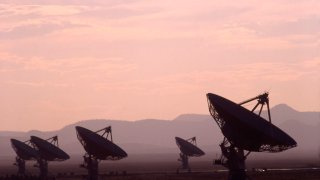
A pioneering researcher in the field of astronomy known as SETI, or the search for extraterrestrial intelligence, Dan Werthimer's work involves scanning the cosmos with huge, ground-based radio telescopes to look for strange or unexplained signals that may have originated from alien civilizations.
In recent years, however, the search for extraterrestrial intelligence has become even more complicated. Increasing demands for mobile services and wireless internet have crowded the radio spectrum, creating interference that can skew data and add "noise" to scientific results.
"Earth is just getting more and more polluted," said Werthimer, chief technologist at the Berkeley SETI Research Center. "With some radio bands, it's already impossible to do SETI because they're so full of television transmitters, WiFI and cellphone bands."
At its heart, SETI research aims to answer the question: Are we alone in the universe? In the decades since scientists first started listening for alien signals, improvements in telescope technology and data processing have bolstered the search, Werthimer said.
Get top local stories in San Diego delivered to you every morning. >Sign up for NBC San Diego's News Headlines newsletter.
Werthimer was recently one of the authors of a pre-print study led by Chinese researchers that identified a radio signal that several news outlets mistakenly reported as having characteristics of an alien civilization. The signal was actually found to have been radio interference, Werthimer clarified.
Read the full story on NBCNews.com.

